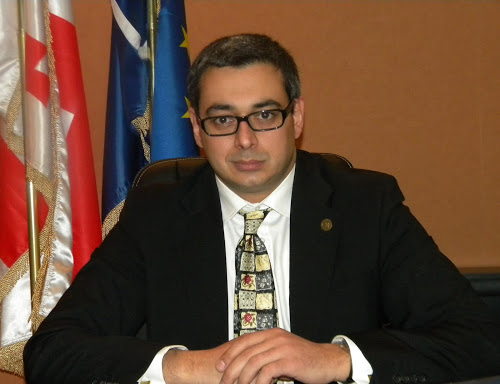
Well-Known Expert Andro Barnovi Named President Saakashvili’s Chief of Staff
Publication: Eurasia Daily Monitor Volume: 10 Issue: 83
By:

The second presidential term of Mikheil Saakashivili is drawing to an end. Despite this fact, the Georgian president has not missed a chance to attract talented individuals into his administration, thus signaling that the end of his term in power does not signify the end of his influence among the liberal, reformist part of Georgian society. At the same time, Saakashvili conveys the message that his political influence as the leader of the Rose Revolution and the Georgian reforms still run strong, despite the fact that some of his perennial colleagues have left his team.
The latest example of such a move was the appointment of the well-known political analyst and expert Andro Barnovi as Saakashvili’s chief of staff (https://www.georgianews.ge/politics/23100-andro-barnov-appointed-as-head-of-presidents-administration.html). The presidential chief of staff position was regarded as very significant in the Georgian hierarchy of state power at the time when Saakashvili personally oversaw the activities of the government—when all ministers, including the prime minister, were members of his team. At that point, the chief of staff was able to influence all governmental decisions, acting on behalf of the president. After the political reforms that changed Georgia from a presidential to a parliamentary system, as well as the presidential United National Movement (UNM) party’s electoral loss in October 2012, however, the situation changed radically—the president lost nearly all instruments for influencing the government’s decisions. So Barnovi’s appointment reflects Saakashvili’s priorities under the new conditions. Presumably, his plan is to become the leader of the new right-leaning opposition following the presidential elections in October 2013.
Notably, Andro Barnovi replaced one of the president’s closest associates, David Tkeshelashvili, who was with Saakashvili since 1995, when the latter was first elected to the Georgian parliament. Tkeshelashvili explained that his resignation was motivated by a job offer from a university in the United States (https://www.georgianews.ge/politics/23100-andro-barnov-appointed-as-head-of-presidents-administration.html). The former chief of staff did not name the university or at even the US state where he would now be working. Hence, many observers concluded that his statement was an excuse to justify his decision to leave the “sinking ship” of Saakashvili’s administration, similar to the recent statement by the former spokesperson for the president, Marika Verulashivili, who distanced herself from the team that had lost the elections (https://rustavi2.com.ge/news/news_text.php?rec_start=40&rec_start_nav=0&id_news=48627&pg=1&srch_w=&im=main&srch=1&ct=0&wth=0&l=0&ddd=). Despite these negative signs, Barnovi’s appointment indicates that Saakashvili still can find and elevate prospective leaders from the part of the Georgian establishment that puts values ahead of political loyalties.
According to his own online professional biography, for the past 15 years, Andro Barnovi has been an active participant in the reforms of Georgia’s public and civil sector. He worked in the Ministry of Defense, the Joint Staff of the Armed Forces, the Georgian parliament—his political platform stressed strong liberal democratic values —the civil sector and in academia, specializing in defense and security, business consultancy, information policies and institutional development. He held higher managerial positions in most of these areas, which allowed him to deal with sector-wide or nation-wide reforms, as well as develop an in-depth understanding of the structural situation in the public sector. His wide-ranging public contacts in business, government and academia contributed to his broad recognition within Georgian society (https://www.visualcv.com/androbarnovi).
Barnovi also has experience with institutional capacity building. Since July 2011, he served as deputy defense minister of Georgia in charge of education and training, personnel policy and analytic direction. At the same time, he founded and became rector of the National Defense Academy of Georgia (NDA). A four-year Cadet Bachelors College, Captains Career School, Command and General Staff School and the School of Advanced Defense Studies were all made parts of the NDA under his supervision and management, and the Bologna Process of education—recognized and adhered to throughout almost all of Europe—was implemented at this institution (https://www.visualcv.com/androbarnovi).
Prior to his work in the defense-related sector, in 2005–2006, he served as the executive director of the Institute of Strategy and Development (STanD) and as its management board chair starting in 2006. The STanD consults various public agencies, including the Ministry of Defense, the State Minister for Reintegration, the National Security Council, the Ministry of Science and Education, various political parties, trade unions, businesses as well as civil society organizations (https://www.visualcv.com/androbarnovi).
Before being appointed Saakashvili’s chief of staff, Andro Barnovi was the governor of the Shida Kartli region, which borders on South Ossetia. Barnovi holds strongly negative views of Russia, often labeling Moscow’s policies as hostile and imperialistic. Immediately after his appointment, Barnovi lashed out at the Georgian government, accusing it of undermining President Saakashvili’s safety. In particular, the new chief of staff discerned an attempt to install surveillance devices and steal important information from the switch room in the president’s palace (https://www.kommersant.ru/doc/2179204/print), forcing Prime Minister Ivanishvili’s personnel to publicly justify themselves. Andro Barnovi’s dynamic success in forcing accountability on the ruling Georgian Dream-led government implies that Mikheil Saakashvili’s team is not likely to gradually fade away into irrelevance. Rather, Barnovi represents a new generation of Georgian politicians who remain attracted to Saakashvili’s pro-Western leadership and political orientation.




